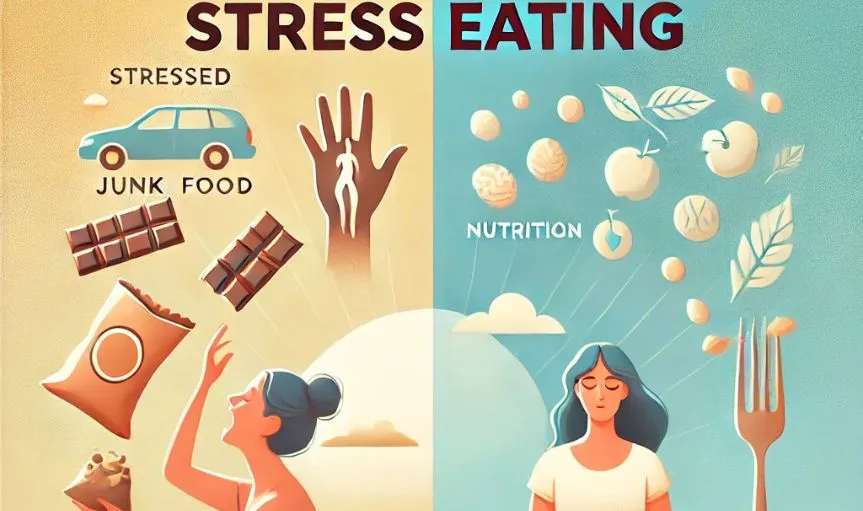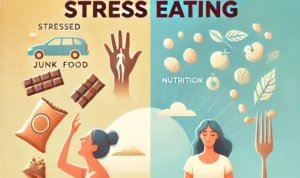Table of Contents
ToggleStress eating, or emotional eating, is a common struggle for many people. It’s the process of eating in response to negative emotions such as anxiety, sadness, or stress, rather than true physical hunger. When we eat to cope with our feelings, it can lead to overeating, weight gain, and a lack of control over our food choices. But, here’s the good news: you can stop stress eating by adopting healthy habits and strategies that target both the emotional and physical aspects of eating. In this guide, we will explore what stress eating is, why it happens, and provide you with 10 practical tips to help you take control of your eating habits and break free from stress eating once and for all. Plus, we’ll introduce YourMealMate, an online nutritionist that can offer personalized support to help you overcome this challenging behavior and develop healthier habits.
What Is Stress Eating?
Stress eating refers to consuming food in response to emotional triggers, such as stress, anxiety, sadness, or boredom. Unlike eating to satisfy physical hunger, stress eating is driven by a need to alleviate emotional discomfort. Often, people reach for unhealthy comfort foods that provide temporary relief, but can lead to overeating and weight gain in the long run. When emotional triggers lead to overeating, it’s easy to fall into a pattern of eating for emotional relief, not nutrition. This cycle of eating out of stress becomes habitual and can be difficult to break without intervention. By understanding what stress eating truly is, we can begin to identify the emotional triggers and work towards healthier coping strategies, making it easier to regain control over our eating behaviors.
Why You Stress Eat?
There are several reasons why people turn to food when stressed, and it’s important to understand these reasons in order to effectively manage the behavior. First, food provides emotional comfort. Eating can trigger the release of feel-good chemicals like dopamine and serotonin, which help you feel more relaxed and momentarily better when you’re upset. This creates a cycle where food becomes your emotional crutch. Second, stress eating can become a learned habit. Over time, your brain associates certain emotions like anxiety or sadness with food, making eating the default reaction when those feelings arise. Additionally, stress activates hormones like cortisol, which can increase cravings, particularly for high-fat, sugary, or comfort foods. Lastly, eating during stressful moments can serve as a temporary distraction. It allows you to shift focus away from emotional or situational distress and into the act of eating, even though this is a short-term solution with long-term consequences. Understanding these factors is the first step toward breaking the emotional eating pattern and finding healthier outlets for stress.
10 Tips to Manage Stress Eating
1. Identify Emotional Triggers
The first step in overcoming stress eating is to recognize your triggers. Identifying what emotional states lead you to reach for food is crucial for addressing the root cause of the behavior. Are there specific situations, feelings, or times of day that tend to make you crave food, even when you’re not truly hungry? Whether it’s work-related stress, relationship problems, or feelings of loneliness, pinpointing these emotional triggers allows you to target the underlying issues rather than masking them with food. By understanding when and why you stress eat, you can better manage your emotional responses and begin breaking the cycle.
2. Find Alternative Stress Relief Methods
Instead of turning to food for emotional comfort, discover healthier and more effective ways to cope with stress. Exercise, such as yoga, walking, or running, is an excellent way to relieve stress and improve your mood. Meditation or deep breathing exercises can help calm the mind and reduce the intensity of stress. Similarly, engaging in a hobby, such as painting, reading, or crafting, can provide a fulfilling distraction. These activities can replace the emotional fulfillment you get from food, ultimately preventing overeating and helping you manage stress without relying on unhealthy habits. Experiment with different techniques to see what works best for you and keep them in your stress-reduction toolkit.
Also read: Why Do You Feel Anxiety After Eating?
3. Keep Healthy Snacks Available
A major reason for stress eating is the temptation of junk food that’s easy to access. Instead of succumbing to unhealthy comfort foods like chips or chocolate, keep healthy snacks on hand. Nutrient-dense foods like fruits, vegetables, nuts, or Greek yogurt provide satisfying, healthy alternatives that nourish your body without adding to your stress. These snacks can help prevent mindless eating when you’re feeling overwhelmed, keeping your energy levels stable and hunger in check. Plus, they help you feel more in control of your food choices, providing a sense of accomplishment rather than guilt.
4. Eat Mindfully
Mindful eating is the practice of being fully present during meals and paying close attention to what and how you eat. This includes noticing the taste, texture, and satisfaction of your food. By engaging in mindful eating, you can learn to slow down, truly recognize when you’re full, and prevent overeating. You’ll also become more attuned to whether you’re eating due to actual hunger or emotional reasons. Slowing down and savoring your food not only makes meals more enjoyable, but it also helps you feel more connected to the act of eating, reducing the likelihood of mindless snacking or emotional eating later.
5. Stay Hydrated
Dehydration is often mistaken for hunger, and sometimes when we think we’re hungry, our bodies are actually craving water. Staying hydrated throughout the day can reduce unnecessary snacking and cravings. Aim to drink water regularly—sometimes sipping it throughout the day helps reduce the urge to eat when your body doesn’t actually need food. You can also drink herbal teas or sparkling water to keep things interesting and prevent the temptation to snack on unhealthy foods. Keeping a water bottle with you at all times can remind you to hydrate and help manage hunger levels more effectively.
6. Practice Stress Management
Managing your stress in healthier, more productive ways is key to breaking the cycle of stress eating. Regular exercise is one of the most effective ways to reduce stress and improve overall well-being. Relaxation techniques, such as mindfulness meditation, journaling, or progressive muscle relaxation, can help calm your nervous system and keep your stress levels in check. If your stress is work-related or comes from other life pressures, taking regular breaks and creating boundaries is essential. Taking the time to check in with your emotional health regularly is crucial for preventing stress from overwhelming you and leading to emotional eating.
7. Get Enough Sleep
Lack of sleep can wreak havoc on your hormones, increasing your appetite and cravings, particularly for high-calorie foods. Poor sleep can lead to higher levels of the stress hormone cortisol, which can exacerbate emotional eating. Getting adequate, restful sleep each night not only helps regulate your hormones, but it also improves your ability to cope with stress. Quality sleep is essential for overall mental health, so aim for at least 7-8 hours of uninterrupted sleep each night. Creating a relaxing bedtime routine and limiting screen time before bed can help improve sleep quality.
8. Stay Busy
When you’re bored, it’s easier to turn to food for comfort. Staying busy with activities that engage your mind and body can help prevent mindless eating. Whether it’s working on a project, spending time with loved ones, or participating in an activity you enjoy, keeping your schedule full can minimize the chances of emotional eating. When your focus is on something productive or enjoyable, your mind is less likely to wander to food. Keeping busy helps ensure that eating isn’t used as a coping mechanism for boredom or emotional discomfort.
9. Practice Portion Control
If you find yourself eating during stressful times, try practicing portion control to prevent overeating. Use smaller plates and bowls, or measure out portions ahead of time so you don’t mindlessly overeat. Eating smaller, balanced meals throughout the day can also help stabilize your blood sugar levels, keeping hunger at bay and reducing the temptation to stress eat. This can help you stay on track without feeling deprived or restricted. By maintaining control over your portions, you empower yourself to make healthier choices even during stressful moments.
You may also like: Is Potato Good for Uric Acid
10. Seek Professional Help
If stress eating has become a persistent problem, seeking professional help is highly recommended. A therapist can help you work through underlying emotional issues, while a nutritionist can guide you in developing a balanced eating plan that supports both physical and emotional well-being. These professionals can provide personalized strategies for managing stress, emotions, and your relationship with food, ensuring that you have the tools you need to break free from stress eating for good.
How YourMealMate Can Help You
YourMealMate is an online nutritionist service designed to support individuals struggling with emotional eating. Through personalized meal plans and tailored nutrition advice, YourMealMate helps you create healthier eating habits while addressing emotional triggers. It’s the perfect solution for those looking to break free from stress eating without sacrificing the enjoyment of food. Whether you need guidance on balanced meals, emotional support, or ongoing accountability, YourMealMate is here to help you regain control over your food choices and improve your relationship with eating.
Conclusion
Stress eating may feel like an impossible habit to break, but with the right strategies and support, you can regain control over your eating patterns. By identifying emotional triggers, practicing mindfulness, and adopting healthy coping mechanisms, you can reduce the urge to eat for emotional reasons. If needed, YourMealMate provides expert guidance to help you stay on track and develop lasting, healthier habits. Remember, breaking the cycle of stress eating is a journey, but with persistence and the right support, you can build a healthier, more mindful relationship with food.
FAQs
How to Break the Habit of Stress Eating?
Breaking the habit of stress eating involves recognizing emotional triggers, replacing food with healthier coping mechanisms, and practicing mindfulness. It’s important to be patient with yourself and seek support when necessary.
What Causes Stress Eating?
Stress eating is caused by a combination of emotional triggers, hormonal imbalances (like cortisol), and learned behaviors. It’s a coping mechanism that provides temporary relief from stress, but leads to unhealthy eating patterns over time.
Is Emotional Eating a Disorder?
While emotional eating itself is not classified as a formal eating disorder, it can contribute to disordered eating behaviors, especially if it becomes frequent or uncontrollable. If emotional eating significantly impacts your health, seeking professional help is essential.
How to Control Eating Urges?
To control eating urges, focus on staying hydrated, practicing mindful eating, and finding alternative stress relief techniques. Staying busy and managing stress effectively also play crucial roles in reducing emotional eating urges.





